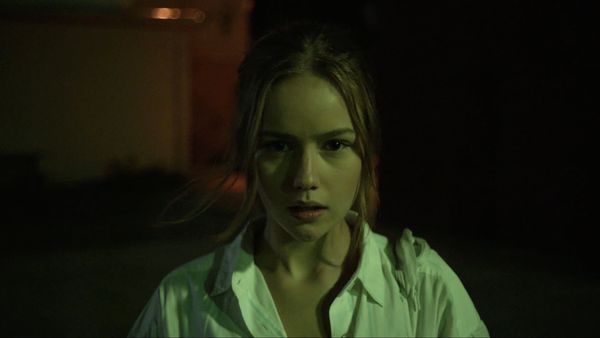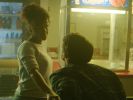Eye For Film >> Movies >> The Boogeywoman (2019) Film Review
The Boogeywoman
Reviewed by: Jennie Kermode

Starting a period unexpectedly is a nuisance whenever it happens. When it's the first one has ever had, it's all the more awkward and emotionally unsettling. Sam (Amélie Hoeferle) is a late starter who was fully aware that this would happen sooner or later but when she has to ask a friend for sanitary protection she could really do without that friend announcing it to everyone at the skate rink where they're partying. She had planned to use the evening as an opportunity to flirt with Trevor (John Henry Ward). Now everything is a mess. It doesn't help that Trevor is scared of blood.
In fact, all the teenagers we meet here are nervous, even if they don't show it directly. They have that bravado that comes from being in a group but feel differently when alone, because, local legend has it, the boogeywoman could be on the hunt. If she's real - as the odd things we glimpse seem to suggest - could she be a threat to a girl who smells of blood? Or is there a stranger relationship at work here, something bound up with the way Sam's experiences change her perception of others?

A couple of years ago, perhaps as a result of the slow advance of women in the film industry, perhaps due to the mass running out of patience evident in #MeToo, the longstanding taboo on acknowledging menstruation in cinema began to break down. The most prominent beneficiary of this was the Oscar-winning Period. End Of Sentence, but a number of other short films have explored the subject from different perspectives. In taking us back to the horror genre which was the first to tread on this forbidden ground (one of Sam's friends is named Carrie in an apparent tribute), writer/director Erica Scoggins recalls the ancient folklore dealing with the subject, her story both allegorical and obscurely brutal.
The Boogeywoman won the Best Short Film award at the 2019 Fantasia International Film Festival and it's easy to see how it beguiled its audience. There are familiar genre tricks here, from the sudden shutting off of lights to the sense of threat created by observing Sam, alone, from a distance, but Scoggins' use of low lighting and shifting frames of reference adds a dreamlike quality to the whole affair. It's confusing to navigate the world at that age and in times of stress it's easy to drift along, acting on instinct. Sam is going through a process of self discovery. The conventional unpleasantness of teenage life makes way for a growing awareness that there's something else out there.
Reviewed on: 08 Aug 2019














